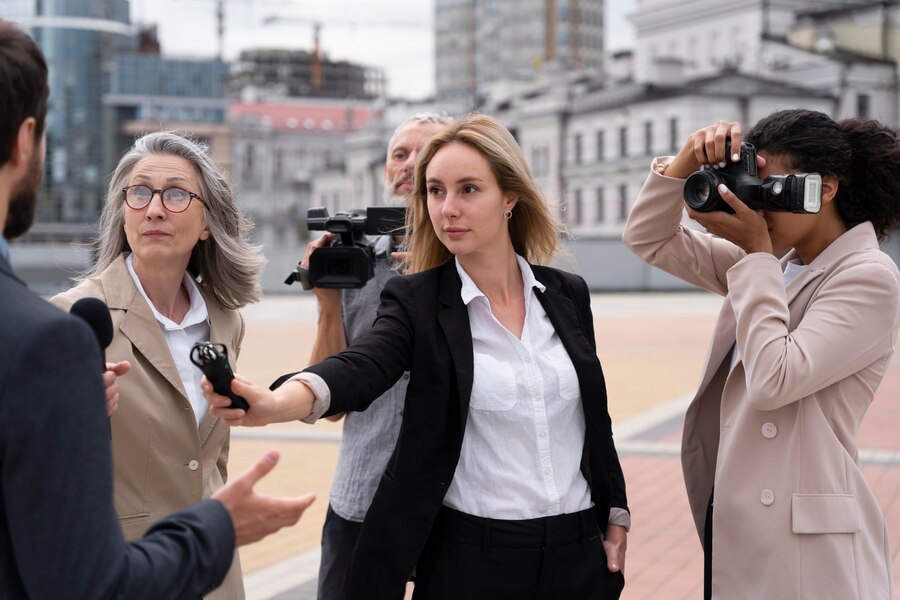LAW
How Media and Public Opinion Can Affect Criminal Cases

Media is omnipresent and serves as one of the primary channels through which people access information about current events, including criminal cases. Whether through television, online news outlets, or social media, information spreads rapidly, and public opinion is often shaped by the narratives presented. However, when it comes to criminal cases, the media’s role can be both helpful and harmful.
Media Coverage of Criminal Cases
The media plays a pivotal role in shaping how the public perceives criminal cases. From traditional news channels and newspapers to digital platforms, the media provides real-time updates on trials, investigations, and criminal proceedings. In high-profile cases, the media’s influence is particularly evident. When a criminal case captures the attention of the public, coverage can become overwhelming, with nearly every aspect of the case dissected and presented to the public.
While this transparency can provide insight into the judicial process, it often leads to an imbalance. Not all criminal cases receive the same level of attention. Cases involving celebrities, politicians, or particularly heinous crimes tend to dominate headlines, leaving others in the shadows. This disproportionate coverage can skew the public’s perception of what is happening in the legal system.
Sensationalism in Reporting
In the race to capture the attention of readers, media outlets sometimes resort to sensationalism. Instead of focusing solely on the facts, they may highlight the most shocking or scandalous aspects of a case to boost viewership. Sensationalized reporting often creates a distorted view of both the victims and the accused, presenting them in extreme lights.
This type of coverage can significantly affect the public’s perception of guilt or innocence, even before a trial has begun. Once the media frames a suspect as guilty or a victim as entirely innocent, it becomes difficult for the public to separate the media narrative from the actual facts of the case. In essence, the media can create an unofficial version of events that influences not only public opinion but also the proceedings within the courtroom.
Formation of Public Opinion
Public opinion is closely tied to the media’s portrayal of criminal cases. People tend to form opinions based on the information they consume, and when the media consistently presents one side of a story, the public’s perception of the case can become biased. This bias can be particularly problematic in criminal cases, where justice hinges on facts and evidence, not public sentiment.
Social media has only amplified the formation of public opinion. Platforms like Twitter, Facebook, and Instagram allow individuals to share their thoughts on ongoing criminal cases, often with little regard for accuracy or objectivity. Hashtags and viral posts can further cement public belief in a particular narrative, creating an environment where judgment is passed long before a verdict is reached in court.
Public Pressure on Legal Proceedings
Public opinion can also directly affect legal proceedings. Prosecutors and judges, while bound by the law, are not immune to the influence of public sentiment. In high-profile cases, there is often a demand for swift justice, and this pressure can push legal professionals to take actions that may not be in the best interest of the case. In situations like this, those being tried for crime are recommended to look into professional criminal defense attorneys experienced in dealing with situations like this.
For instance, advocacy groups or political figures may leverage public outrage to push for harsher sentences or quicker resolutions. While the justice system is designed to be impartial, public opinion can create a political climate in which decisions are influenced by the fear of public backlash rather than a fair evaluation of the facts. This pressure compromises the integrity of the legal process. Another way public pressure can affect a legal proceeding can be shown when many people push for overturning cases they believe are wrongful convictions.
Effect on Jury Decisions
One of the most significant ways in which media and public opinion can affect criminal cases is through their impact on juries. In cases that receive extensive pretrial publicity, it can be difficult to find impartial jurors. Many potential jurors may have already formed opinions based on the media’s portrayal of the case, making it challenging to ensure that the defendant receives a fair trial.
Jurors are meant to base their decisions solely on the evidence presented in the courtroom. However, when they have been exposed to media coverage that paints a particular picture of the defendant or the crime, it becomes nearly impossible for them to set aside their biases.
Trial by Media
The term “trial by media” refers to the phenomenon in which the media, rather than the courts, essentially determines the outcome of a case. In such cases, the media’s portrayal of the accused and the victim becomes so powerful that it overshadows the actual legal proceedings. The public, often influenced by the media’s narrative, can come to a collective decision about the guilt or innocence of the accused well before the trial concludes.
There are numerous examples of cases where trial by media has affected jury decisions, leading to wrongful convictions or, in some instances, unfair acquittals. The Casey Anthony case, for example, is often cited as an instance where media coverage played a critical role in shaping public opinion, even though the jury ultimately acquitted her.
Impact on Defendant’s Rights
One of the fundamental principles of the justice system is the presumption of innocence — the idea that the accused is considered innocent until proven guilty. However, when media coverage is overwhelming, this presumption is often eroded. The media may present the defendant as guilty before all the evidence is heard, making it difficult for the public (and sometimes even the jury) to maintain an unbiased perspective.
To counteract the effects of media influence, courts sometimes implement measures like gag orders, which prevent parties involved in the case from speaking to the press, or jury sequestration, which isolates jurors from outside information. While these measures can help preserve a defendant’s right to a fair trial, they are not always effective in today’s digital age. Information spreads rapidly online, and even the most stringent measures may not completely insulate jurors from outside influences.
Long-Term Consequences of Media Influence
Media coverage can have long-term consequences on public trust in the justice system. When the media presents a narrative that contradicts the outcome of a case, public outrage can follow, leading to a lack of confidence in legal institutions. Cases where the media implies guilt but the jury delivers an acquittal often spark public outcry and further mistrust in the justice system’s ability to deliver fair verdicts.
Even when a defendant is acquitted, the media’s portrayal of them during the trial can lead to lasting reputation damage. The accused may face stigma, loss of employment opportunities, and social ostracization long after the trial has ended. In many ways, the media’s influence can serve as a form of punishment, even if the defendant is ultimately found innocent.
The media’s influence on criminal cases is undeniable. While it plays a crucial role in informing the public, its power to shape narratives can also be detrimental to the legal process. Sensationalism, public pressure, and the impact on jury decisions all pose challenges to ensuring a fair trial. Moving forward, it is essential to find a balance between transparency in reporting and protecting the rights of defendants to preserve the integrity of the justice system.
LAW
Drive Social Media Lawsuit: Allegations & Industry Impact

Clients have accused Drive Social Media of making exaggerated claims regarding potential returns on investment. Allegations suggest that the agency misrepresented the effectiveness of its strategies, leading clients to invest substantial sums based on inflated promises. For instance, a retail e-commerce brand reportedly invested over $500,000 but experienced results that fell significantly short of expectations.
Unethical Billing Practices
The lawsuit also highlights concerns about billing practices. Clients claim they were charged for services not rendered or faced hidden fees not disclosed upfront. Such practices have led to disputes over payments and a loss of trust in the agency’s financial dealings.
Data Misrepresentation
Another serious accusation involves the manipulation of performance data. Clients allege that Drive Social Media provided skewed analytics, inflating metrics like engagement, traffic, and conversions. This alleged data falsification misled clients about the success of their campaigns.
Labor Law Violations
Former employees have come forward with allegations of labor law violations, including unpaid wages, lack of overtime pay, and insufficient breaks. Additionally, claims of workplace discrimination based on race and gender have surfaced, further complicating the agency’s legal challenges.
Legal Proceedings and Current Status
The lawsuit has progressed through various legal stages, with both parties presenting evidence and arguments. As of now, the case remains ongoing, with no final verdict reached. The proceedings have drawn attention from industry observers, eager to see how the legal system addresses these serious allegations.Lawexpertise
Industry Implications
The Drive Social Media lawsuit serves as a cautionary tale for businesses engaging digital marketing agencies. It underscores the importance of due diligence, transparent contracts, and clear communication. Businesses are advised to scrutinize service agreements, demand regular performance reports, and be wary of agencies offering guarantees that seem too good to be true.
Conclusion
The Drive Social Media lawsuit has illuminated potential pitfalls in the digital marketing industry, emphasizing the need for ethical practices, transparency, and accountability. As the legal proceedings continue, businesses and marketing professionals alike should reflect on the lessons learned to foster a more trustworthy and effective marketing environment.
FAQs
What is the Drive Social Media lawsuit about?
The lawsuit involves allegations against Drive Social Media for misleading marketing practices, unethical billing, data misrepresentation, and labor law violations.
How has the lawsuit impacted the digital marketing industry?
The case has heightened awareness about the importance of transparency and ethical conduct in digital marketing, prompting businesses to be more cautious when selecting agencies.
What can businesses learn from this lawsuit?
Businesses should ensure clear and transparent agreements with marketing agencies, demand regular and verifiable performance reports, and be cautious of agencies offering unrealistic guarantees.
Is the lawsuit still ongoing?
Yes, as of now, the lawsuit is ongoing, with both parties presenting their arguments and awaiting a final verdict.
Where can I find more information about the lawsuit?
For detailed information, you can refer to legal analyses and news articles available on reputable law and business websites.
LAW
Patel Bakersfield City Council Threats: Legal Community Impact

Introduction
In April 2024, Riddhi Patel, a 28-year-old Bakersfield resident, made headlines after allegedly threatening members of the Bakersfield City Council during a public meeting. This incident has sparked widespread discussions about public discourse, legal accountability, and community safety. This article delves into the details of the event, the subsequent legal proceedings, and the broader implications for the Bakersfield community.
The Incident
On April 10, 2024, during a Bakersfield City Council meeting, Riddhi Patel was escorted out after making verbal threats against council members. These threats were reportedly related to a resolution concerning a Gaza ceasefire. Patel’s actions drew immediate attention and raised concerns about the safety of public officials and the conduct of public meetings.
Legal Proceedings
Following the incident, Patel faced multiple felony charges. She was accused of making death threats toward the Bakersfield City Council, leading to her appearance in court for hearings. The legal proceedings have been closely followed, highlighting the serious consequences of threatening public officials.
Community Impact
The threats against the Bakersfield City Council have had a profound impact on the local community. Residents have expressed concerns about the safety of public officials and the potential chilling effect on public discourse. The incident has sparked discussions about the balance between free speech and the need to protect individuals from threats and harassment.
Comparative Analysis: Legal Consequences for Threatening Public Officials
To provide a broader perspective, here is a comparison of legal consequences for individuals who threaten public officials in various jurisdictions:
| Jurisdiction | Legal Consequences | Notable Cases |
|---|---|---|
| United States | Federal and state laws impose severe penalties, including imprisonment and fines. | Riddhi Patel’s case in Bakersfield, California. |
| United Kingdom | Offenses under the Malicious Communications Act can lead to imprisonment. | Case of a man jailed for sending threatening letters to MPs. |
| Canada | Criminal Code provisions allow for prosecution with potential imprisonment. | Individual convicted for threatening a Member of Parliament. |
| Australia | Laws against threatening communications can result in significant penalties. | Person sentenced for sending threatening emails to a senator. |
| Germany | Threatening public officials is a criminal offense with potential jail time. | Case of a man convicted for threatening a local mayor. |
Conclusion
The case of Patel Bakersfield City Council Threats against the Bakersfield City Council underscores the critical importance of maintaining respectful and lawful communication within democratic societies. It highlights the need for legal frameworks that protect public officials from threats while safeguarding the fundamental right to free speech. As the legal proceedings continue, the community remains vigilant, reflecting on the balance between individual rights and public safety.
LAW
Nashville Law Firm Demands Transparency in Chris Young Arrest, Advocates for Fair Treatment of All Citizens

Nashville, TN — Recently, country showbiz star Chris Young was arrested which caused a stir in the society and due to that, Nashville TN Law has issued an appeal for more fairness and transparency in celebrity arrest cases. In the wake of the release of the security footage that cast doubt on the behavior of the law enforcement officers during the arrest then the firminstead is stressing on the best practices and independence of person rights during such arrest.
Security Footage Raises Concerns
The event that took place at the convenience store and recorded on a security camera raised public awareness of how police officers responded to the case. The leaked video has brought a lot of concern and debate on how Chris Young was arrested, where he seemed to have been apprehended in a rather aggressive way that may have been unlawful to the rights of the artist.
While the transparency rises, Nashville TN Law should seek to understand if the police use different treatment methods after big-name arrests such as Chris Young.Truck accident lawyer Nashville According to David Raybin from Nashville TN Law, ‘’Such tapes can give important information concerning the events that led to the arrest’. This footage is helpful in making sure that the police force is always on the line for their conduct.” Primally, all people who are offenders should be treated equally regardless of their public visibility and they should enjoy equal rights under the constitution and the law.
Commitment to Legal Advocacy
Nashville TN Law has been practising personal legal services in both criminal defense and civil litigations, such as car accidents, and wrongful arrest. Some of the skills that Center for is selected from are the firm’s experience in personal injury law which has enabled its clientele to appreciate the necessity of shield when dealing with either police or other entities.
Aside from personal injury, Nashville TN Law practices law involving medical malpractice, wrongful death and civil rights violations. With experience on their side, the firm can help victims pursue justice after suffering a civil rights violation — whether in connection with an arrest, during incarceration or any other situation that involves excessive force/focus.
Said “Everybody, famous or not, deserves a fair trial.” “We must allow our legal system the opportunity to right a wrong if security footage can show someone’s rights were violated. This case shows the important need of law enforcement and agencies to be transparent, to act within the scope of the law and for communities.
Advocating for Systemic Change
The firm’s advocacy extends beyond individual cases; car accident lawyer nashville is dedicated to pushing for systemic change in how arrests and interactions with law enforcement are handled, particularly in Tennessee. In the wake of incidents like the Chris Young arrest, Nashville TN Law calls for clearer guidelines and increased oversight to ensure that high-profile individuals and everyday citizens alike receive fair treatment.
“Police departments must continually assess their procedures and practices to ensure they are not only effective but also just,” David Raybin continued. “We are committed to supporting reforms that make our legal system fairer for everyone, regardless of their status or background.”
About Nashville TN Law
Nashville TN Law is a highly rated legal firm based in Nashville Tennessee with a focus on accident injury, cases involving death, civil rights abuses and defense law. Our team of Nashville TN Law attorneys has years of experience and is guaranteed to ensure the rights of the citizens who have been harm by others, including policemen, are observed. In its services, the firm provides all form of legal services with an aim of making sure that the clients get the justice they require.

 Cartoon1 year ago
Cartoon1 year agoUnlocking the Potential of Nekopoi.care: A Comprehensive Guide

 Game1 year ago
Game1 year agoExploring Aopickleballthietke.com: Your Ultimate Pickleball Destination

 BUSINESS1 year ago
BUSINESS1 year agoWhat Companies Are In The Consumer Services Field

 BUSINESS12 months ago
BUSINESS12 months agoUnraveling the Mystery of 405 Howard Street San Francisco charge on Credit Card

 HOME IMPROVEMENT1 year ago
HOME IMPROVEMENT1 year agoVtrahe vs. Other Platforms: Which One Reigns Supreme?

 TECHNOLOGY12 months ago
TECHNOLOGY12 months agoThe Guide to Using Anon Vault for Secure Data Storage

 ENTERTAINMENT8 months ago
ENTERTAINMENT8 months agoUnderstanding Bunkr Album: A Comprehensive Guide

 ENTERTAINMENT1 year ago
ENTERTAINMENT1 year agoThe Epic Return: Revenge of the Iron-Blooded Sword Hound
















